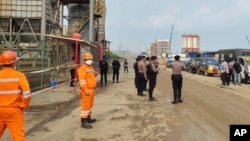The Indonesian government tells VOA it is investigating a deadly explosion at a Chinese-owned nickel plant early Sunday that killed eight Indonesian and five Chinese workers, and injured at least 46 people.
The Coordinating Ministry for Maritime and Investment called for a thorough investigation into the cause of the smelting furnace explosion at the Indonesia Tsingshan Stainless Steel factory, a subsidiary of PT Indonesia Morowali Industrial Park (PT IMIP) on the island of Sulawesi.
Septian Hario Seto, deputy for Investment and Mining Coordination at the Coordinating Ministry for Maritime Affairs and Investment, told VOA that a team from the ministry is traveling to the site “to ensure that all aspects in handling this accident are based on the plan or procedure.”
The industrial park said Sunday evening that the blast occurred when workers were repairing the furnace. Spokesperson Dedy Kurniawan told VOA the 46 injured victims were hurt by hot steam and most of them are still under medical observation.
"The management of PT IMIP has covered all costs of treatment and care for [the] victims after the accident, as well as compensation for the families of the victims. We have also handed over one victim's body to the victim's family," said Dedy.
He added that the smelter furnace number 41 that caught fire was closed for maintenance operations, however he said there was residual slag in the furnace that apparently encountered flammable material.
Central Sulawesi Police Chief Agus Nugroho said the explosion was so powerful that it demolished the furnace and damaged parts of the side walls of the building around 5:30 a.m. local time. It took around four hours to extinguish the blaze.
A representative from the Labor Party and the Prosperous Indonesian Workers Union in Morowali, Katsaing, who goes by one name, told VOA that they are urging the government to form an independent-fact-finding team to investigate. “They should open a thorough investigation, not just based on one-sided information from the employers only,” said Katsaing.
He urged the government and companies to implement occupational safety and health standards. “In many cases, there are still some supervisors appointed by the company who do not have the standard’s certification and lack of training,” Katsaing told VOA by phone.
A spokesperson for Indonesia’s largest and oldest environmental advocacy group told VOA that similar incidents have occurred in Central Sulawesi in recent years, without any repercussions for the companies.
Aulia Hakim, lead campaigner for WALHI Central Sulawesi, said that earlier this year, on April 27, two workers at another nickel factory in the same industrial park were killed in a similar incident. A year earlier, on December 22, 2022, two workers at another nickel industry smelter also in Central Sulawesi were killed in another similar incident.
Despite those deaths, WALHI Central Sulawesi’s records show that not a single company was given strict sanctions by the government for work accidents that claimed the lives of workers.
"From a series of work accidents, the government has never given any sanctions at all. If there are any settlements, it’s not informed to the public. We doubt that the local or central government is capable or have the capacity to intervene in the business in here,” said Aulia Hakim.
Indonesia is trying to develop downstream nickel industries and lure major manufacturers of electric vehicles and batteries to invest in Indonesia. Sulawesi is one of the islands built as a hub for the production of nickel, a base metal used for electric vehicle batteries and stainless steel.
The nickel smelting plants are also part of China’s ambitious transnational development program known as the Belt and Road Initiative.
Yoanes Litha contributed to this report from Central Sulawesi, Indonesia.




